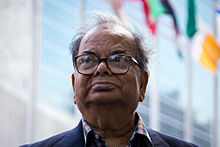
Sunil Gangopadhyay or Sunil Ganguly was an Indian poet, novelist, short story writer, and critic in the Bengali language. He was one of the foremost poets experimenting with new forms, themes, rhythms, and words in Bengali poetry in the 1950s and 1960s. In 1953, along with Deepak Majumder and Ananda Bagchi, he founded the Bengali poetry magazine, Krittibas. He is regarded as one of the most prolific and popular writers in Bengali since Rabindranath Tagore.

Mahasweta Devi was an Indian writer in Bengali and an activist. Her notable literary works include Hajar Churashir Maa, Rudali, and Aranyer Adhikar. She was a leftist who worked for the rights and empowerment of the tribal people of West Bengal, Bihar, Madhya Pradesh and Chhattisgarh states of India. She was honoured with various literary awards such as the Sahitya Akademi Award, Jnanpith Award and Ramon Magsaysay Award along with India's civilian awards Padma Shri and Padma Vibhushan.
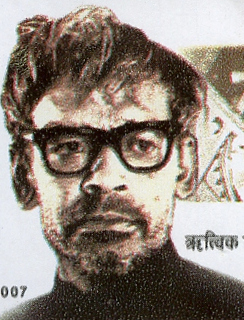
Ritwik Kumar Ghatak was an Indian film director, screenwriter, actor and playwright. Along with prominent contemporary Bengali filmmakers like Satyajit Ray, Tapan Sinha and Mrinal Sen, his cinema is primarily remembered for its meticulous depiction of social reality, partition and feminism. He won the National Film Award's Rajat Kamal Award for Best Story in 1974 for his Jukti Takko Aar Gappo and Best Director's Award from Bangladesh Cine Journalist's Association for Titash Ekti Nadir Naam. The Government of India honoured him with the Padma Shri for Arts in 1970.

Utpal Dutt was an Indian actor, director, and writer-playwright. He was primarily an actor in Bengali theatre, where he became a pioneering figure in Modern Indian theatre, when he founded the "Little Theatre Group" in 1949. This group enacted many English, Shakespearean and Brecht plays, in a period now known as the "Epic theatre" period, before it immersed itself completely in highly political and radical theatre. His plays became an apt vehicle for the expression of his Marxist ideologies, visible in socio-political plays such as Kallol (1965), Manusher Adhikar, Louha Manob (1964), Tiner Toloar and Maha-Bidroha. He also acted in over 100 Bengali and Hindi films in a career spanning 40 years, and remains most known for his roles in films such as Mrinal Sen’s Bhuvan Shome (1969), Satyajit Ray’s Agantuk (1991), Gautam Ghose’s Padma Nadir Majhi (1992) and Hrishikesh Mukherjee's breezy Hindi comedies such as Gol Maal (1979) and Rang Birangi (1983). He also did the role of a sculptor, Sir Digindra Narayan, in the episode Seemant Heera of Byomkesh Bakshi on Doordarshan in 1993, shortly before his death.
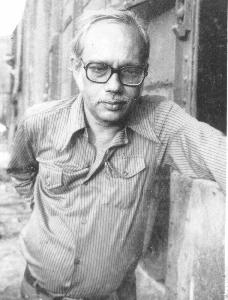
Shakti Chattopadhyay was an Indian poet and writer who wrote in Bengali. He is known for his realistic depictions of rural life. He was a green poet, many of his poems raised the issue of nature in crisis. Through his poems he urged to protect Mother Nature and plant trees.
Several fiction, non-fiction and cinemas were based on Kolkata or depicted Kolkata from certain point of views. Some of such works are listed here.

Subodh Ghosh was a noted Indian author of Bengali literature and a journalist associated with the Kolkata-based daily newspaper Anandabazar Patrika. His best known work, Bharat Premkatha, is about the romances of epic Indian characters and has remained very popular in the Bengali literary world. Many of his stories have been adapted in Indian films, most notably Ritwik Ghatak's Ajantrik (1958) and Bimal Roy's Sujata (1959). He won the Filmfare Award for Best Story twice, for Bimal Roy's Sujata (1960) and for Gulzar's Ijaazat in 1989. He was selected as a recipient for the Bharatiya Jnanpith Award (1977) but he refused it.
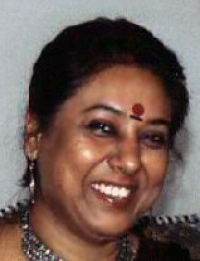
Mallika Sengupta was a Bengali poet, feminist, and reader of Sociology from Kolkata, known for her "unapologetically political poetry".
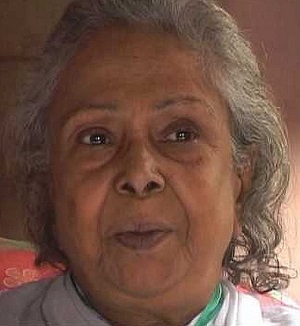
Gita Dey was an Indian actress in Bengali cinema, theatre and Bengali folk theater. She became a stage artist at the age of 6 years. She came to the film industry in 1943. Her first film release was Ahuti (1941) as a child actress. She acted in over 200 Bengali-language films and over 2,000 stage shows. She acted in the movie Teen Kanya by Satyajit Ray and Rittik Ghatak's Meghe Dhaka Tara, Subarnarekha, Komal Gandhar, and Kato Ajanare. She also acted in Hindi movies such as Parineeta (2005) with Vidya Balan and Sanjay Dutt and other movies. She was associated with All India Radio for a long time doing Shruti Natok. She received the Presidential Award for Lifetime Achievement from Dr. A.P.J. Abdul Kalam and many other awards during her lifetime.
Nabarun Bhattacharya was an Indian writer who wrote in the Bengali language. He was born at Berhampur, West Bengal. He was the only child of actor and playwright Bijon Bhattacharya and writer and activist Mahashweta Devi. His maternal grandfather was a writer from the Kallol era Manish Ghatak. Visionary filmmaker Ritwik Ghatak was his great uncle.
Kato Ajanare (1959) is an unfinished Bengali drama film directed by Ritwik Ghatak. The storyline was based on a Bengali novel written by Mani Shankar Mukherjee with the same title. The film was shot on a 20-day schedule. The shooting was complete, except the court scene. The film was discontinued and abandoned for mainly financial and some other problems.
Kato Ajanare may refer to:
Kato Ajanare is a Bengali novel written by Mani Shankar Mukherjee. This was Shankar's first novel which mainly deals with author's memories of Mr. Barwell, a renowned Barrister of the Calcutta High Court.

Meghe Dhaka Tara is a 2013 Indian Bengali film directed by Kamaleswar Mukherjee and made under Shree Venkatesh Films banners. The film is inspired by the life and works of Bengali film director Ritwik Ghatak. The entire film is in black and white except the last scene which has been shot in colour. In this film Saswata Chatterjee plays the character of Nilkantha Bagchi and Ananya Chatterjee plays the role of Durga, Nilkantha's wife. The film was released on 14 June 2013. Besides giving an account of Ghatak's life, the film also depicts the socio-political environment of contemporary West Bengal during the Tebhaga and Naxalite movements.

Kamaleswar Mukherjee, M.B.B.S. is an Indian film director, actor, and physician known for his work in Bengali-language films. Films directed by him include Chander Pahar (2013), Meghe Dhaka Tara (2013), Amazon Obhijaan (2017) Cockpit (2017).
Mandakranta Sen is an Indian poet of Bengali language. She became the youngest ever winner of Ananda Puraskar in 1999 for her very first poetry book. In 2004, she was awarded Sahitya Akademi Golden Jubilee Award for poetry. She quit medical studies to become a full-time writer.
Shyamal Gangapadhyay was a Bengali novelist and editor born at Khulna. He received Sahitya Academy Award in 1993 for the novel of Shahjada Darasukoh, based on the life of Mughal Emperor Dara Shukoh. He also wrote the story 'Vasco Da Gamar Bhaipo' and 'Parostri'.
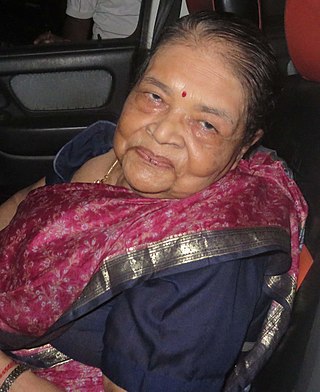
Binapani Mohanty was an Indian Odia language writer and academician. She was well known for her works such as Patadei and Kasturi Mriga. She was a professor in economics before retiring. She had been awarded Padmashree by the Government of India and Atibadi Jagannatha Das Sammana by Odisha Sahitya Akademi. She had earlier won the Sahitya Akademi Award and Sarala Award. She had served as chairperson of Odisha Lekhika Sansad.
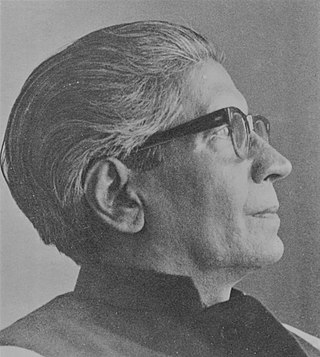
Abu Sayeed Ayyub was an Indian philosopher, teacher, literary critic and writer in both Bengali and English. Though born into a traditional, Urdu-speaking, Muslim family in Calcutta (Kolkata), he was so deeply captivated in his early teenage by the poems of the Indian Nobel Laureate Rabindranath Tagore that he taught himself Bengali so as to appreciate Tagore better. Later, when he started to write, it was mostly in his adopted language, Bengali. During the initial part of his writing career, Ayyub wrote on aesthetics, religion and socialism. However, it was his philosophical and scientific analysis of creative literature - in particular the poetry and the drama of Tagore - that finally brought him wide recognition as "one of the most serious and original Tagore scholars". Ayyub is also credited with "co-editing the first anthology of modern Bengali poetry". He taught philosophy at the University of Calcutta, the Visva-Bharati University and the University of Melbourne, and edited the literary and philosophical journal Quest.
